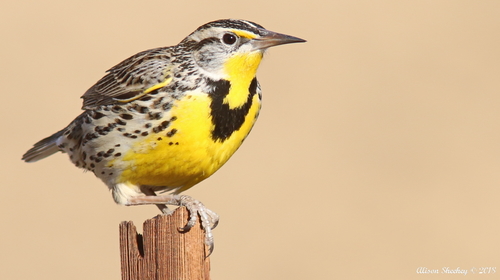
Western Meadowlark
The Western Meadowlark (*Sturnella neglecta*) is a medium-sized songbird iconic to the grasslands and open fields of western North America. Known for its bright yellow breast, marked by a distinctive black "V" across the chest, this bird is more often heard than seen. Its flute-like song is a characteristic sound of the prairies. Ecologically, the Western Meadowlark plays a role in controlling insect populations, and its presence is often an indicator of healthy grassland ecosystems. It holds cultural significance as the state bird of six U.S. states: Kansas, Montana, Nebraska, North Dakota, Oregon, and Wyoming.
16-26 cm
Length
38-42 cm
Wingspan
Least Concern
Conservation Status
Distribution
The Western Meadowlark's range extends from southwestern Canada, through the western and central United States, and down into northern Mexico. Some populations are resident year-round, while others migrate south for the winter, particularly those in the northernmost parts of their range. They are rarely found east of the Mississippi River.
Lifespan
Typically 3-5 years in the wild, although some individuals may live longer.
Western Meadowlark's Habitat
Habitat Types
Grasslands, Prairies, Pastures, Savannas, Agricultural fields (with sufficient cover)
Climate Zones
Temperate, Subtropical
Adaptations
Their ground-nesting habits and cryptic plumage coloration provide camouflage in open grassland environments. Strong legs and feet are adapted for walking and running on the ground, where they forage for food.
Variations
Several subspecies have been described, differing slightly in plumage coloration and song, but these are not always consistently recognized. There is some overlap in range and song with the Eastern Meadowlark, leading to occasional hybridization.
Appearance
Breeding Plumage
Breeding plumage is brighter, with a more intense yellow breast and a more sharply defined black 'V'. Non-breeding plumage is duller and more buff-colored, with the black 'V' less distinct.
Seasonal Feather Changes
Plumage becomes more worn and faded as the breeding season progresses. Molting occurs after breeding, resulting in the duller non-breeding plumage.
Sex Based Plumage Differences
Males generally have brighter yellow underparts and a more distinct black 'V' than females. Females are more cryptically colored, with more brown streaking.
Notable Features
Bright yellow breast with a prominent black 'V'., White outer tail feathers, visible in flight., Long, pointed bill., Brown and black streaked upperparts.
Diet and Feeding
Primary Foods
Insects (especially grasshoppers, crickets, and beetles), Spiders, Seeds, Grains
Foraging Behavior
Western Meadowlarks primarily forage on the ground, walking and probing the soil with their bills. They may also glean insects from vegetation. They occasionally catch insects in flight.
Specializations
Their strong, pointed bill is well-suited for probing the ground and extracting insects from soil and vegetation.
Seasonal Diet Variations
Their diet shifts seasonally. Insects are the primary food source during the breeding season, providing protein for growing chicks. In winter, they rely more heavily on seeds and grains.
Behavior
Social Structure
Generally solitary or in pairs during the breeding season. They may form small flocks in the winter, especially during migration.
Communication
A complex, flute-like song, often described as a series of clear, whistled notes., Various calls, including a sharp 'chupp' and a rattling alarm call., Visual displays, such as spreading the tail and flashing the breast.
Migration
Many populations are migratory, moving south for the winter. The timing and distance of migration vary depending on the location of the breeding grounds. They often migrate in loose flocks.
Territorial or Group Behaviors
Males are highly territorial during the breeding season, defending their territories with song and aggressive displays. They are often polygynous, with one male mating with multiple females.
Conservation
Threats
Habitat loss and degradation (due to agriculture, urbanization, and overgrazing), Pesticide use (reducing insect prey), Nest parasitism by Brown-headed Cowbirds, Climate change (potentially altering habitat and breeding cycles)
Protection Programs
Conservation Reserve Program (CRP) in the US (provides habitat on agricultural lands), Various state and federal wildlife management programs
Local National Laws
Protected under the Migratory Bird Treaty Act in the US and Canada.
Population Trend
Decreasing
Population Estimates
Partners in Flight estimates a global breeding population of 49 million. (Not Evaluated)
Interesting Facts
Western Meadowlarks are the state bird of six US states.
This reflects their widespread presence and cultural significance in the American West.
They often build a dome over their nests.
This helps to conceal the eggs and chicks from predators.
Their song is significantly different from the Eastern Meadowlark.
This helps to maintain reproductive isolation between the two species, even where their ranges overlap.
Western Meadowlarks have a unique way of walking
They walk, rather than hop, as they forage for food
Faqs about Western Meadowlark
What is the difference between a Western and Eastern Meadowlark?
The easiest way to distinguish them is by their song. The Western Meadowlark has a complex, flute-like song, while the Eastern Meadowlark's song is a simpler, whistled 'see-you-see-yeeer'. Visually, the Western Meadowlark has more yellow on its malar region (the 'cheek'), while the Eastern has more white.
Are Western Meadowlarks endangered?
No, they are currently listed as 'Least Concern' by the IUCN. However, their populations have been declining in recent decades due to habitat loss and other factors.
What do Western Meadowlarks eat?
They primarily eat insects, especially during the breeding season. In winter, they also eat seeds and grains.
Where do Western Meadowlarks nest?
Western Meadowlarks nest on the ground in grassy areas. The nest is usually a domed structure made of woven grasses.
Copyright @ Nature Style Limited. All Rights Reserved.
 English
English